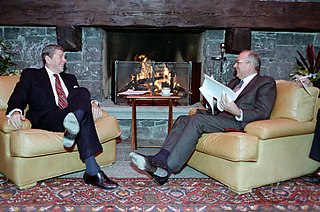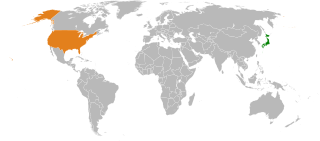External links
| | This biography of an American political scientist is a stub. You can help Wikipedia by expanding it. |
Robert S. Ross (born April 9, 1954) is a professor of political science at Boston College, associate of the Fairbank Center for Chinese Studies at Harvard University, senior advisor of the security studies program at the Massachusetts Institute of Technology, and a member of the Council on Foreign Relations. He is one of the foremost American specialists on Chinese foreign and defense policy and U.S.-China relations.
As editor:
| | This biography of an American political scientist is a stub. You can help Wikipedia by expanding it. |

A superpower is a state with a dominant position characterized by its extensive ability to exert influence or project power on a global scale. This is done through the combined means of economic, military, technological and cultural strength as well as diplomatic and soft power influence. Traditionally, superpowers are preeminent among the great powers.
"China's peaceful rise", sometimes referred to as "China's peaceful development", was an official policy in China under former paramount leader Hu Jintao which sought to assure the international community that China's growing political, economic, and military power would not pose a threat to international peace and security. It characterized China as a responsible world leader that avoids unnecessary international confrontation, emphasizes soft power, and vows that China is committed to its own internal issues and improving the welfare of its own people before interfering in world affairs. Furthermore, it sought to rebut the "China threat theory" and reestablish the view of China as a nonthreatening world power, as historically Chinese empires were regarded as less aggressive.
Grand strategy or high strategy is the long-term strategy pursued at the highest levels by a nation to further its interests. Issues of grand strategy typically include the choice of primary versus secondary theaters in war, distribution of resources among the various services, the general types of armaments manufacturing to favor, and which international alliances best suit national goals. With considerable overlap with foreign policy, grand strategy focuses primarily on the military implications of policy. A country's political leadership typically directs grand strategy with input from the most senior military officials. Development of a nation's grand strategy may extend across many years or even multiple generations.

Kenneth Neal Waltz was an American political scientist who was a member of the faculty at both the University of California, Berkeley and Columbia University and one of the most prominent scholars in the field of international relations. He was a veteran of both World War II and the Korean War.

David M. Lampton is George and Sadie Hyman Professor and Director of China Studies Emeritus at the Johns Hopkins Paul H. Nitze School of Advanced International Studies (SAIS) and former Chairman of The Asia Foundation. He was president of the National Committee on United States-China Relations from 1988-1997. From May 1998 to May 2006 he also was affiliated with The Nixon Center as the founding director of its Chinese Studies Program. Prior to 1988, Dr. Lampton was founding director of the China Policy Program at the American Enterprise Institute and associate professor of political science at Ohio State University where he started his academic career in 1974. After serving as Oksenberg-Rohlen Fellow at Stanford University's Asia-Pacific Research Center (2019-2020), he returned to SAIS where he is Senior Research Fellow at the Foreign Policy Institute. In 2020, with co-authors Selina Ho and Cheng-Chwee Kuik, he published Rivers of Iron: Railroads and Chinese Power in Southeast Asia, on PRC high-speed rail construction in eight Southeast Asian states.
The People's Liberation Army Daily, or PLA Daily for short, is the official newspaper of the Chinese People's Liberation Army (PLA). Institutionally, the PLA Daily is the mouthpiece of and speaks for the General Political Department of the PLA, and in that capacity speaks on the part of the PLA itself. Its editorial line hews closely to that found in the Chinese Communist Party's own official newspaper, People's Daily.

Japan–United States relations or Japanese–American relations refers to international relations between Japan and the United States. Relations began in the late 18th and early 19th century, with the diplomatic but force-backed missions of U.S. ship captains James Glynn and Matthew C. Perry to the Tokugawa shogunate. The countries maintained relatively cordial relations after that. Potential disputes were resolved. Japan acknowledged American control of Hawaii and the Philippines and the United States reciprocated regarding Korea. Disagreements about Japanese immigration to the U.S. were resolved in 1907. The two were allies against Germany in World War I.
The primary responsibility for the Japanese foreign policy, as determined by the 1947 constitution, is exercised by the cabinet and subject to the overall supervision of the National Diet. The prime minister is required to make periodic reports on foreign relations to the Diet, whose upper and lower houses each have a foreign affairs committee. Each committee reports on its deliberations to plenary sessions of the chamber to which it belongs. Special committees are formed occasionally to consider special. Diet members have the right to raise pertinent policy questions—officially termed interpellations—to the minister of foreign affairs and the prime minister. Treaties with foreign countries require ratification by the Diet. As head of state, the emperor performs the ceremonial function of receiving foreign envoys and attesting to foreign treaties ratified by the Diet.

Gilford John Ikenberry is a theorist of international relations and United States foreign policy, and the Albert G. Milbank Professor of Politics and International Affairs at Princeton University.
In international relations, offensive realism is a structural theory belonging to the neorealist school of thought put forward by political scholar John Mearsheimer in response to defensive realism. Offensive realism holds that the anarchic nature of the international system is responsible for the promotion of aggressive state behavior in international politics. It fundamentally differs from defensive realism by depicting great powers as power-maximizing revisionists privileging buck-passing and self-promotion over balancing strategies in their consistent aim to dominate the international system. The theory brings important alternative contributions for the study and understanding of international relations but remains nonetheless the subject of criticism.
Robert Jeffrey Art is Christian A. Herter Professor of International Relations at Brandeis University, and Fellow at MIT Center for International Studies. He subscribes to the theory of neorealism, which argues that force still underlies the power structure in the modern world. He is a member of the Council on Foreign Relations, a United States nonprofit think tank specializing in U.S. foreign policy and international affairs.

This is an English language bibliography of scholarly books and articles on the Cold War. Because of the extent of the Cold War, the conflict is well documented.

Professor Yan Xuetong is a distinguished professor and dean of the Institute of International Relations at Tsinghua University. In 2008, he was named as one of world's Top 100 Global Thinkers by the American journal Foreign Policy. He is the only political scientist listed as Most Cited Chinese Researchers by Elsevier during 2014-2017. Yan is a member of the Chinese Communist Party.
In international relations, the term smart power refers to the combination of hard power and soft power strategies. It is defined by the Center for Strategic and International Studies as "an approach that underscores the necessity of a strong military, but also invests heavily in alliances, partnerships, and institutions of all levels to expand one's influence and establish legitimacy of one's action."
Neoclassical realism is an approach to foreign policy analysis. Initially coined by Gideon Rose in a 1998 World Politics review article, it is a combination of classical realist and neorealist – particularly defensive realist – theories.
The Fletcher School's International Security Studies Program is a center for the study of international security studies and security policy development. It was established in 1971 at The Fletcher School of Law and Diplomacy, Tufts University. ISSP conducts its academic activity through courses, simulations, conferences, and research. It also has a military fellows program for midcareer U.S. officers.
The Second Cold War, also called Cold War II or the New Cold War, is a term describing post-Cold-War era of political and military tensions between the Western powers, especially the United States, and either China or Russia.
Allen Suess Whiting was an American political scientist and former government official specializing in the foreign relations of China.
The History of Indian foreign policy refers to the foreign relations of modern India post-independence, that is the Dominion of India (from 1947 to 1950) and the Republic of India (from 1950 onwards).

In political science, triangular diplomacy is a foreign policy of the United States, developed during the Vietnam War (1955–1975) by Henry Kissinger, as a means to manage relations between contesting Communist powers, the Soviet Union and China. Connecting heavily with the correlating policy of linkage, the policy was intended to exploit the ongoing rivalry between the two Communist powers, as a means to strengthen American hegemony and diplomatic interest.